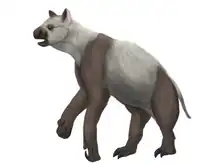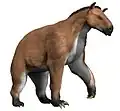| Hesperotherium Temporal range: Early to Middle Pleistocene | |
|---|---|
 | |
| Life restoration | |
| Scientific classification | |
| Domain: | Eukaryota |
| Kingdom: | Animalia |
| Phylum: | Chordata |
| Class: | Mammalia |
| Order: | Perissodactyla |
| Family: | †Chalicotheriidae |
| Genus: | †Hesperotherium Qiu Zhan-Xiang, 2002 |
| Species: | †H. sinense |
| Binomial name | |
| †Hesperotherium sinense Qiu Zhan-Xiang, 2002 | |
Hesperotherium is a genus of chalicotheres from the Early to Middle Pleistocene of China. Along with Nestoritherium, it was one of the last of the chalicotheres to ever exist. It belonged to the subfamily Chalicotheriinae, which also includes Anisodon, Chalicotherium and Nestoritherium.[1]
Etymology
The genus name, Hesperotherium, is derived from the Greek hesperos, meaning "dusk" or "west" and therion, meaning "beast". The specific name means "from China".[1]
Palaeoecology
Hesperotherium would have coexisted with the proboscidean Sinomastodon, the giant ape Gigantopithecus, the pig Hippopotamodon, the mouse-deer Dorcabune, and the deer Cervavitus, as well as the pandas Ailuropoda wulingshanensis and Ailuropoda microta, the dhole Cuon antiquus, the tapir Tapirus sinensis and the proboscidean Stegodon.[2] Other classic animals typically include orangutans, macaques, rhinos, hedgehogs, hyenas, horses, the cow Leptobos, pikas, the extinct pigs Sus xiaozhu and S. peii, muntjac, Cervus (a deer), gaur (a cow), the goat-antelope Megalovis, and more rarely the large saber-toothed cat Megantereon.[3][2]
References
- 1 2 Zhan-Xiang, Q. I. U. (2002-12-15). "HESPEROTHERIUM - A NEW GENUS OF THE LAST CHALICOTHERES". Vertebrata PalAsiatica. 40 (4): 317. ISSN 2096-9899.
- 1 2 Jin, C.; Wang, Y.; et al. (2014). "Chronological sequence of the early Pleistocene Gigantopithecus faunas from cave sites in the Chongzuo, Zuojiang River area,South China". Quaternary International. 354: 4–14. Bibcode:2014QuInt.354....4J. doi:10.1016/j.quaint.2013.12.051.
- ↑ Zhu, M.; Schubert, B. W.; Liu, J.; Wallace, S. C. (2014). "A new record of the saber-toothed cat Megantereon (Felidae, Machairodontinae) from an Early Pleistocene Gigantopithecus fauna, Yanliang Cave, Fusui, Guangxi, South China". Quaternary International. 354: 100–109. Bibcode:2014QuInt.354..100Z. doi:10.1016/j.quaint.2014.06.052.
